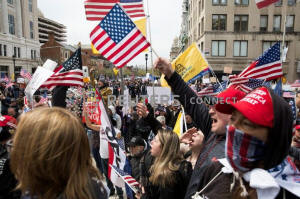As protesters decry U.S. coronavirus lockdown, officials urge caution
 Send a link to a friend
Send a link to a friend
 [April 21, 2020]
By Jarrett Renshaw [April 21, 2020]
By Jarrett Renshaw
HARRISBURG, Pa. (Reuters) - The U.S. debate
over restrictions for fighting the coronavirus intensified on Monday, as
protesters labeled mandatory lockdowns as "tyranny," while medical
workers and health experts cautioned that lifting them too soon risked
unleashing a greater disaster.
With health authorities and many governors warning that far more testing
is needed before the U.S. economy can be safely reopened, New York state
launched the nation's most ambitious effort yet to screen the general
population for exposure to the virus.
At the same time, researchers began an effort to test residents of an
entire town near San Francisco for antibodies, while a broader sampling
in Los Angeles County suggested 40 times as many people were infected
there as the number of cases previously documented.
At least three more governors, nevertheless, moved to loosen
restrictions on commerce in their states.
South Carolina Governor Henry McMaster, a Republican, signed an order
allowing retail shops and department stores to resume business on
Tuesday, with limits on how many customers are allowed in. Colorado
Governor Jared Polis, a Democrat, said he would permit reopening of hair
salons, child care centers and real estate offices, also subject to
social-distancing measures, starting next week.

And Georgia Governor Brian Kemp, a Republican whose state reported over
1,200 new infections and a spike in deaths on Monday, announced that
gyms, hair salons, bowling alleys, tattoo parlors and massage parlors
could reopen on Friday, followed on Monday by movie theaters and
restaurants.
Stay-at-home orders and widespread business closures imposed in most
states to slow the spread of the virus have stifled the U.S. economy and
thrown at least 22 million people out of work, a level of unemployment
not seen since the Great Depression of the 1930s.
The economic damage has led to increasing agitation for relaxing
social-distancing restrictions, especially as the rate of coronavirus
hospitalizations and other indicators of the outbreak's severity have
begun to level off in recent days.
In Pennsylvania, where Democratic Governor Tom Wolf has pledged to veto
a bill in the Republican-led General Assembly that would force him to
reopen some businesses, several hundred demonstrators, some in cars with
horns blaring, rallied in the state capital, Harrisburg.
CYNICISM VS. FEAR
Many protesters were skeptical about the actual scale of the pandemic,
accusing political leaders of over-reaching.
"All the projections were wrong, but we are still telling people to stay
home and businesses to close. This is not quarantine, this is tyranny,"
said Mark Cooper, a 61-year-old retired truck driver.
Others portrayed the stay-at-home measures as essential to save lives.
Yetta Timothy, who was part of a counter-protest in Harrisburg, said the
nursing home where she worked had lost an untold number of patients.
"They are dying everyday," said the 43-year-old nurse, crying and
holding a sign that read: "My life is on the line."
"I just can't believe all of this is happening, that they want to go
back to work," she said.
Protests demanding an end to stay-at-home restrictions also were held in
Pittsburgh and in the Connecticut state capital, Hartford.
[to top of second column]
|

Demonstrators gather to protest against the state's extended
stay-at-home order to help slow the spread of the coronavirus
disease (COVID-19) in Harrisburg, Pennsylvania, U.S., April 20,
2020. REUTERS/Rachel Wisniewski

Monday's demonstrations, like those in the capitals of several other
states in recent days, including Michigan, Minnesota, Virginia,
Maryland, Washington state and Colorado, drew large contingents of
self-identified supporters of President Donald Trump.
Expressing sympathy for the protesters, Trump lashed out on Twitter
last week at Democratic governors in three electoral swing states,
saying their stay-at-home orders had gone too far.
One governor Trump targeted, Gretchen Whitmer of Michigan, said she
appealed to Vice President Mike Pence during a gubernatorial
conference call on Monday for federal officials to speak out in
support of social-distancing restrictions imposed by state leaders.
Whitmer told reporters after the call that Pence, who is leading the
Trump administration's pandemic response, vowed on the call to do as
she requested.
WARNINGS OF RESURGENCE
Medical professionals on the front lines of the battle to curb the
pandemic, which erupted in China late last year, have said the
United States could face a second and even deadlier wave of
infections if the lockdowns end prematurely.
The United States has by far the world's largest number of confirmed
cases of COVID-19, the highly contagious lung disease caused by the
coronavirus, with more than 778,000 known infections and over 42,300
deaths, nearly half of them in the state of New York, according to a
Reuters tally.
Dr. Anthony Fauci, head of the National Institute of Allergy and
Infectious Diseases, told ABC News there would be no real economic
recovery until authorities got the virus under control and jumping
the gun could lead to a big spike in cases.

"It's going to backfire, that's the problem," he said.
New York Governor Andrew Cuomo said testing has to get up to scale
before reopening, adding that he was aware some people were unhappy
they had to wear masks or engage in social distancing. "It's not a
question of happy - it's a question of life and death." .
Researchers on Monday began conducting antibody blood tests on New
York state residents to obtain a baseline of how many may have
actually been exposed to the novel coronavirus. Cuomo said specimens
would be collected from a random sample of 2,000 people a day in
what he called the most aggressive such project to date in the
United States.
(Reporting by Jarrett Renshaw in Harrisburg, Pennsylvania; Joey Ax,
Barbara Goldberg and Jessica Resnick-Ault in New York, and Nathan
Layne in Wilton, Connecticut, Doina Chiacu in Washington, Keith
Coffman in Denver, and Dan Whitcomb in Los Angeles; Writing by Paul
Simao and Steve Gorman; Editing by Bill Tarrant and Raju
Gopalakrishnan)
[© 2020 Thomson Reuters. All rights
reserved.] Copyright 2020 Reuters. All rights reserved. This material may not be published,
broadcast, rewritten or redistributed.
Thompson Reuters is solely responsible for this content. |